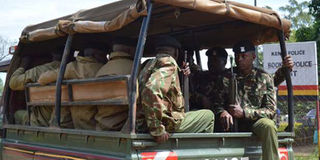Police brutality has no place in Kenya

Security officers at Booker Police Patrol Base in Mumias on November 23, 2016. Police brutality should not be condoned. PHOTO | ISAAC WALE | NATION MEDIA GROUP
What you need to know:
- It is alarming that Kenyans were not outraged by this act of impunity by law enforcement officers.
- The ideal, yet attainable situation would be where our leaders remain loyal to common decency and reject such hooliganism.
Recently, there were disturbing pictures of a young man being battered by the police.
The man, who was taking part in a peaceful demonstration in Nyeri, was unarmed and clearly outnumbered by the police officers.
I found it alarming that the officers did not care that their illegal actions were being recorded by the media.
The photos were a chilling reminder that the 2010 Constitution and the changes that it promised have not been fully embraced by some elements in the Kenya Police Service.
The photos were a scary reminder of the dark days of Kanu, when human rights activists and other conscientious Kenyans were brutalised as the police defended a declining regime.
It is alarming that Kenyans were not outraged by this act of impunity by law enforcement officers.
The loud silence does not bode well for Kenya, especially as we prepare for the next General Election.
For the umpteenth time, the police have no right to use excessive force against unarmed citizens, whether they are protesting or not.
Assaulting people is not only criminal, it is also counterproductive because it does not persuade them to walk the narrow path of the law.
In fact, such actions encourage the youth to be anti-system, which ultimately makes the work of the police harder and more treacherous.
It means that the youth begin to see the police as people to be wary of.
PERILOUS TIMES
The challenge increases as we move towards the elections.
We talk about positive youth participation in national development, with political participation being touted as key.
The response to the Nyeri youth when they sought to voice their displeasure at their exclusion from local politics contradicts the professed determination to give them a greater political playing field.
Is it any wonder then that they are susceptible to political manipulation?
It does not help when the police reach beyond the youth to humiliate elected leaders through violent means, as they allegedly did to Bomet Governor Isaac Ruto.
The image of Ruto, badly beaten and completely diminished, also made the rounds in the mainstream and social media.
Only a few voices from the opposition gave an indication that what Governor Ruto had suffered was wrong.
The studious silence from the leaders in the ruling party, while somewhat expected, is completely unacceptable.
It sends the signal that police violence is fine provided it is aimed at the opposition.
The ideal, yet attainable situation would be where our leaders remain loyal to common decency and reject such hooliganism.
We are sliding down a slippery slope towards the elections, when the youth are easily excitable and when the peace in this country can be ruptured by little provocation.
AVOID ANARCHY
To avoid such a situation, therefore, it is important that law enforcers lead the way in observing the law.
Similarly, national and local leaders, regardless of their political party leanings, should condemn such violence.
Now is not the time to allow partisan politics to be a consideration in determining what is acceptable and what is not.
It is time to encourage the democratic creed that divergent opinions, when legally expressed, can and should be harmonised.
To break the law while apprehending those who break it is not only criminal in itself, it is also hopelessly out of fashion.
The so-called “effective” means by which the police suppressed dissenting views, as they did with the likes of Timothy Njoya decades ago, is crude and unacceptable.
If there is any lesson to be drawn from the American elections, it is that even the views of an unpopular person such as Donald Trump are respected if they are expressed legally.
That is the meaning of democracy and order in a civil society.
The writer is a youth public health consultant. [email protected]





